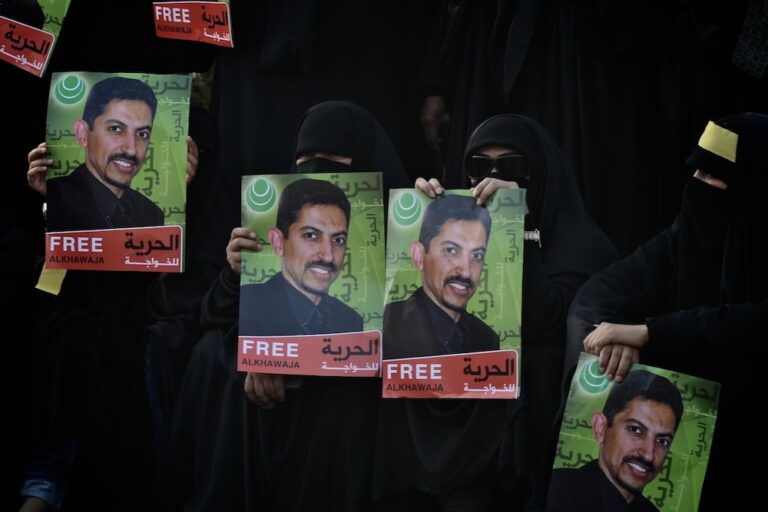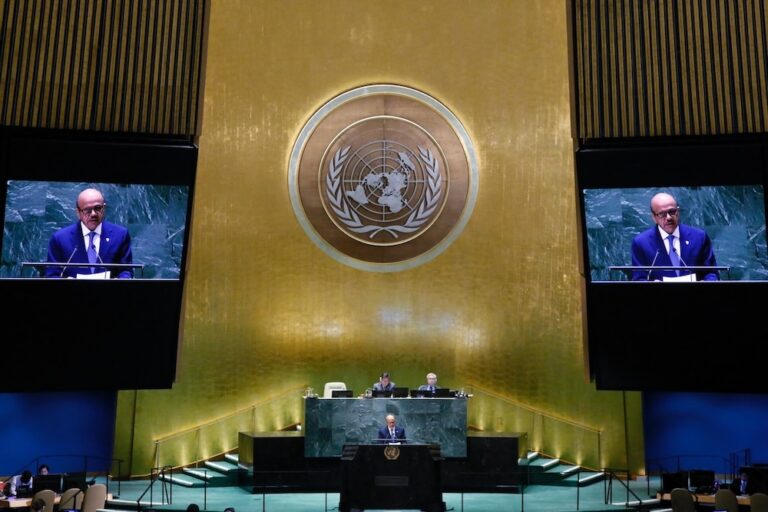(BCHR/IFEX) – The Bahrain Center for Human Rights (BCHR) is alarmed by the widening scope of a censorship and internet blocking campaign, led by Mai Al-Khalifa, Minister of Information and member of the ruling family, targeting dissident voices about Bahrain. This campaign has extended to social networking sites such as Facebook, blocking any discussions the […]
(BCHR/IFEX) – The Bahrain Center for Human Rights (BCHR) is alarmed by the widening scope of a censorship and internet blocking campaign, led by Mai Al-Khalifa, Minister of Information and member of the ruling family, targeting dissident voices about Bahrain. This campaign has extended to social networking sites such as Facebook, blocking any discussions the authorities consider subversive.
BCHR has conducted some research on the extent of this battle against freedom of expression inside Facebook to report on the following recent incidents of censorship of Facebook entries. BCHR believes that these samples do not comprise an exhaustive list:
– “Discrimination and sectarian oppression in Bahrain, a Systematic Reality” a report, in English, by Nabeel Rajab, president of BCHR, displayed on PressTV ( http://www.presstv.ir/detail.aspx?id=86562§ionid=3510303 ). This report is posted on the BCHR Facebook page
– A BCHR alert posted on IFEX, which appears on the BCHR Facebook page, on the prosecution of journalist Lamees Dhaif, in both English and Arabic. ( http://ifex.org/en/content/view/full/101406 )
– “A Window Overlooking Bahrain,” a report in Arabic by Kawther Ali, “Aljazeeratalk” reporter, covering some aspect of recent popular protests and human rights violations in Bahrain ( http://www.aljazeeratalk.net/portal/content/view/4152/56 )
– Amnesty International’s recent report on human rights defenders covering Middle East and North Africa, posted on the BCHR Facebook page ( http://www.amnesty.org/en/library/as…0012009ara.pdf ). Brief coverage of this report was also posted on the BBC Arabic site
– An electronic forum by the University of Bahrain students, posted on the BCHR Facebook page, managed by a group of students covering issues of academic and public concern. An electronic vote is displayed on its main page ( http://www.uobvoice.net/forums/index.php?showtopic=747 )
– A “Washington Post” piece on a “Democracy Appeal”, a petition addressed to US President Obama by 163 American and overseas politicians, human rights defenders, academics, and others, calling for the U.S.’s commitment to genuine democratization and support of human rights in the Muslim world and a promise to cease supporting autocrats and dictators in this part of the world. This article and the letter with signatories, was posted on Facebook by activist AJ Alsingace, Head of the Human Rights Unit in the HAQ Movement of Civil Liberties and Democracy
– A link to page 4 of the 14 February issue of “Alwasat” newspaper, showing different portraits of human rights violations, with an English comment: “UTTERLY untrue. Bahrain is a safe haven. People enjoy freedom of expression, assembly, religious practice, etc. Children, youth, women and seniors are enjoying it!” This remark and link was posted on BCHR’s Facebook page by the activist AJ Alsingace. ( http://www.alwasatnews.com/pdf/default.asp?issue_number=2381&p=1 )
– Facebook provides a free SMS service for its members. The authorities blocked the downloading of the application software from the site, which is required for the Facebook chat service.
What is interesting is that these items and comments are accessible outside of Facebook. BCHR believes that the drive behind the eagerness of the Bahraini Authorities to block these and similar dissident entries on Facebook is the realization that this social site has extensive accessibility and distribution.
Nabeel Rajab, president of BCHR, responded to this campaign:”We consider this campaign to be a war against all forms of expression”. He added: “This war has widened to include even social and worldwide renowned sites like Facebook. We are dismayed that this war is spearheaded by Mai Al-Khalifa, a lady modeled as liberal and presented with many medals in recognition of her support to culture and liberalism”. Rajab concluded: “We are wary of these accolades. Mai Al-Khalifa’s actions, with regards to restricting freedom of expression, should be the basis for the retractions of those accolades.


